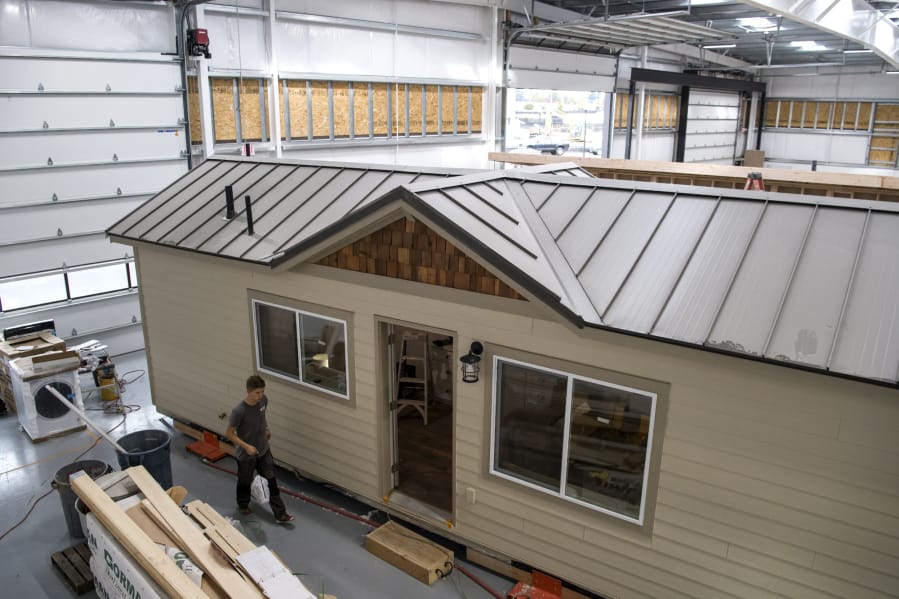BATTLE GROUND — Business was picking up for tiny home builder Derek Huegel and Wolf Industries in October 2017 when they were hit with a “stop working” order from the city of Battle Ground.
Huegel looks back on the order fondly while sitting in the office of his company’s new 10,000-square-foot building, which became its home in August. After starting a woodworking company at the age of 16, Huegel continued to work as a contractor until 2016, when he transformed it into a tiny home construction company. He has since built about 36 homes and is sitting on a backlog of about 15 more, including some destined for California to help families displaced by wildfires.
“It was the best thing that happened to us,” Huegel, 29, said of last year’s stop order. “It pushed us to get this space.”
The company had been operating on a leased lot in a residential neighborhood. Crews built the homes outside under an awning, and neighbors started to complain about the noise. The city visited the site and gave Wolf a stop order because the awning was not permitted.
“We knew they moved into an existing contractor’s establishment, which is itself a grandfathered facility in a residential neighborhood,” said Sam Crummett, planning supervisor for the city. “Their business really started growing and they were doing work outside, building additional structures to house their facility. That’s when we received some complaints from nearby neighbors.”
Crummett said the city didn’t want to close down the business, and instead gave the company a deadline on when it had to be out of the site.
“They grew out of what was grandfathered in,” Crummett said. “We found some middle ground between what their business needs were and what the neighbors’ needs were.”
Within a few days, Huegel put a bid in for the plot at 1601 S.E. Commerce Ave., Battle Ground. In August, Wolf Industries moved into its new 10,000-square-foot office space there. On a recent visit, the company’s 15-20 employees were working on three different tiny homes, one of which will be sent to California to house a family displaced by the 2017 North Bay Fires through the nonprofit Homes for Sonoma.
Wolf shipped its first home to California on Monday. Huegel said Wolf was contracted to build five homes for the nonprofit, with the possibility of more later. The plan is to use the homes for families displaced by the fires. Once those families move, the plan calls to relocate the tiny homes to a more permanent location for others in need of housing.
“Normally people get those FEMA trailers,” Huegel said. “They’re not as attractive. These are a step up with a repurposed use.”
Huegel said his company was referred to Homes for Sonoma by another builder. Word of mouth is also how Wolf Industries has been able to keep growing since it became a tiny home builder in 2016. Huegel started the company when he was attending Battle Ground High School. He now runs it with his brother, Travis Huegel, 27.
Wolf offers a few different floor plans for its homes, which range from 300 to 600 square feet and range in price from $50,000 to $80,000. They have room for a full-size refrigerator, washer and dryer, and an oven. One home the company was working on recently came with built-in bookcases.
“It’s a serious solution that meets a lot of people’s needs,” Huegel said.
He said most of his local business serves Clark County’s aging population; the houses are purchased by families so an older relative can come live with them. Others purchase them with plans on renting them out, or younger couples have bought them while looking to start a family.
“I’m trying to build the common house for the common people,” Huegel said.
Crummett said the city gets calls about tiny homes from time to time, but there’s not enough interest to warrant specific regulations for them. Battle Ground treats tiny homes like accessory dwelling units, he said.
Huegel and his wife, Bethany Huegel, spent their first year or so of marriage in a tiny home on Bethany Huegel’s father’s property. Derek Huegel said his father-in-law built one as a guest house and was ahead of the recent tiny home craze.
“It really served its purpose well,” Derek Huegel said. “We saved like crazy. The cost was super low and helped us buy our first house.”
The two now have six kids, a few too many to make it work in a tiny home, but Huegel has one on his property in Battle Ground. After living in one, it took him a few years to come back to the idea. He was burnt out as a contractor, traveling from Seattle to Salem, Ore., for jobs and wanted something closer to home.
“I wanted local, clean work,” he said. “I wanted something that was scaleable. I want something where there was a large market with high demand.”
Huegel said he knew it would be something in construction, but still needed to find something that fit his criteria. He gave it some thought for about three years and had an idea about smaller homes. A friend showed him one of the tiny home television shows and he learned that it was a growing trend. He and his crew built one to test it out, and found someone to rent it immediately. They did again with the same outcome. Huegel said some of his employees were concerned with changing over to tiny homes, as some like being out in the field working on jobs. Now they walk around their new workspace singing while building homes.
“This is what we were meant to do,” he said. “It’s much more in alignment with our strengths as a company. We’re innovative. We take a problem and make it into a solution.”




